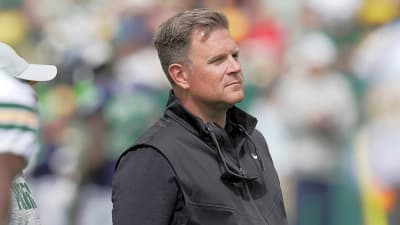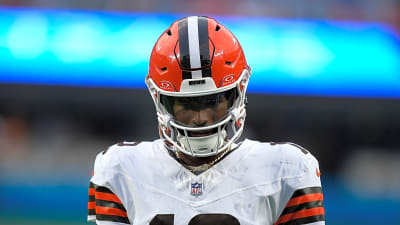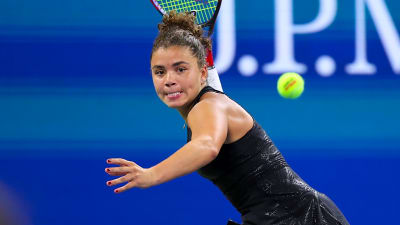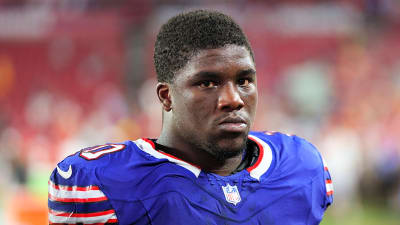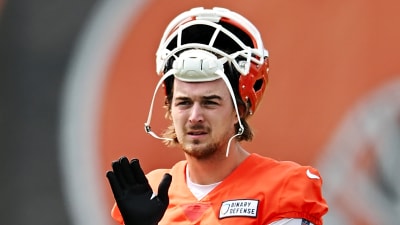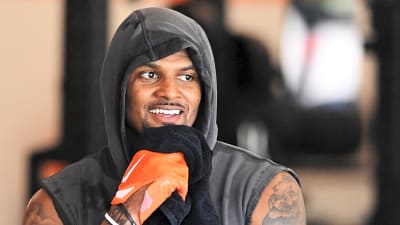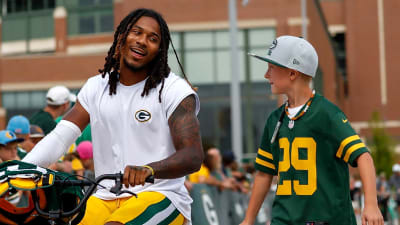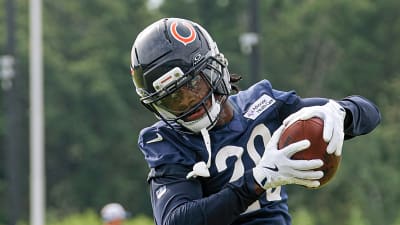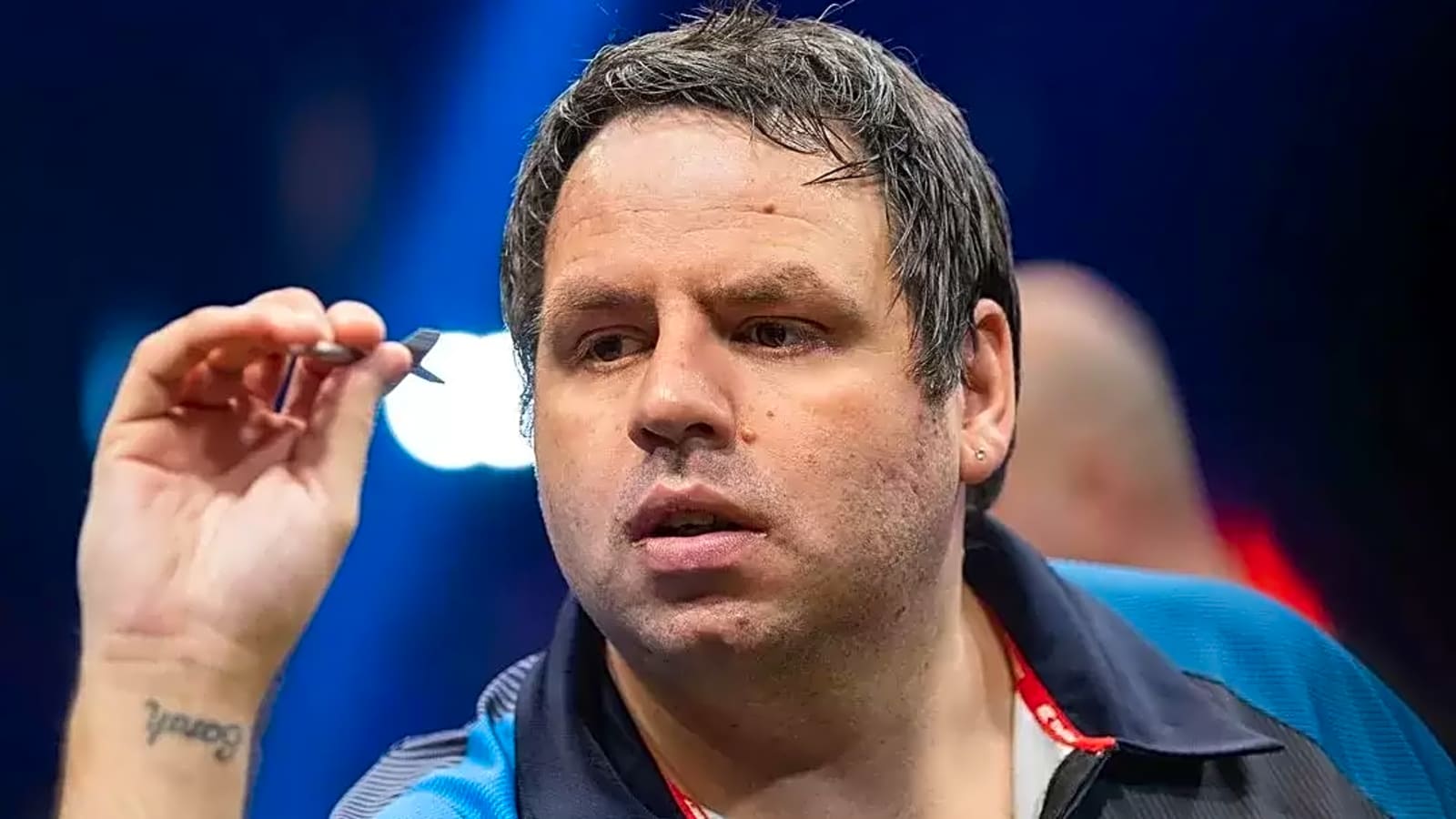
Adrian Lewis, the two-time world champion, is famously known for his effortless style, frequent 180s and has been a household name in darts for over a decade. Nicknamed 'Jackpot,' Lewis enjoyed major successes throughout his career but has, in recent years, somewhat faded from the spotlight. In the new series 'Murph Meets' from the MODUS Super Series, the 40-year-old opens up candidly about his childhood, his breakthrough in the sport, the pressures of high expectations, and the reasons behind his decision to step back from competitive darts for a time.
Lewis grew up in Newcastle-under-Lyme, near Stoke-on-Trent. “It was actually quite a rough area,” he recalls. “But I just had a normal childhood, playing all sorts of sports: football, athletics, anything really.”
As a young teenager, he aspired to be a football goalkeeper. “I was coached by top trainers and was expected to make it into the senior team. But that never materialized. Then darts came along.”
He also had unexpected talent in athletics. He won a high jump competition, despite never having tried it before. “Being tall and lanky, it just came naturally,” he laughs.
The move to darts came by chance. After leaving school, he worked in construction. “The lads would play darts after work. The local darts teams came in, and I kept beating them. That’s how it all started.”
Lewis quickly proved himself a natural. He was hitting 180s almost immediately. His first official match was as a substitute in his aunt’s team. “I hit a 180 in my very first match,” he recalls.
Soon after, his mother entered him into the British Teenage Youth Championship, the top youth tournament of the time. Competing against names like James Wade, Lewis won the title. That was the moment he realised he had a future in darts.
Meeting Phil Taylor
A key turning point came when Lewis crossed paths with Phil Taylor. “I was playing for a Super League team, and Phil came by for a charity event. He’d heard a lot about me and asked if I wanted to practice with him.”
Six months later, Taylor called him to set it up. It was the beginning of a formative learning period. Although Lewis grew up watching players like Raymond van Barneveld and Andy Fordham, he quickly learned the demands of professional darts firsthand. When Lewis began competing in PDC events, he proved he could beat established stars. Within seven tournaments, he reached a semi-final. “That’s when I realised: I could make a living from this.”
The media branded him as Phil Taylor’s heir, which brought both opportunity and pressure. “Many players who couldn’t beat Phil tried to take it out on me,” says Lewis. “I became a sort of battering ram. But I didn’t feel pressured — I just played my game.”
Lewis’ first World Championship in 2006 produced an infamous clash with Peter Manley, known for mind games. “He kept talking during my throws, trying to unsettle me. At one point, I thought: that’s it, I might just walk off the stage.”
However, the encounter became a crucial learning experience. “I realised: on stage, you have no friends. That moment made me stronger.” It was also when Lewis executed his first blind 180, a move that later went viral on YouTube.
World Champion 2011: The Rise of an Entertainer
Lewis reached his career pinnacle in 2011, winning his first world title. In the final against Gary Anderson, he hit a nine-darter, the first ever in a World Championship final. “That’s every darts player’s dream: to win the world title and hit a nine-darter,” Lewis says proudly. “But I actually forgot about the nine-darter immediately because Gary kept throwing everything at me. I just had to focus on winning the match.”
The final also marked a turning point for the sport: fast, flamboyant players like Lewis reshaped darts, challenging the methodical style that had dominated for decades. In 2012, Lewis defended his world title, despite a season of inconsistency and adapting to new darts. “It was a rollercoaster, but Eric Bristow said to me, ‘You’ve got no chance.’ That flipped a switch. The killer instinct came back.”
His semi-final against James Wade is legendary. Trailing 5-1, Lewis came back to win. “When you’re in that zone, it feels like you can’t miss.”
The final had to be played the same day because of random drug testing. “We got back to the hotel at six a.m. I hadn’t slept a wink, but I still won.”
Battles with Taylor and Van Gerwen
Even after his world titles, Lewis played memorable matches, including a Grand Slam of Darts showdown with Taylor and a World Matchplay thriller against Michael van Gerwen. “Sometimes I averaged 107 and still lost,” Lewis says. “That shows how tough it was. Phil was at his peak, averaging 105–106 regularly.”
Fans had high expectations that Lewis and Van Gerwen would dominate the next decade. But Lewis admits he became complacent, had personal issues, and “lost love for the game.”
Lewis has been candid about stepping back from darts. His wife Sarah suffers from a chronic kidney condition, and their daughter has autism, ADHD, and learning difficulties. “Sometimes I’d be at a tournament at nine a.m., and I didn’t want to be there. I knew something had to change. Family comes first.”
He emphasizes that darts players are often judged unfairly. “People say: ‘What a waste of talent,’ but nobody knows what goes on behind the scenes.”
Lewis was sometimes labeled controversial. He explains, “I prefer to speak up on stage. Many players wait until interviews to complain, but then the referee can’t do anything.”
His direct approach led to heated moments, but for Lewis, it was simply “two lads arguing on stage.”
Though taking a break, Lewis follows the sport closely. He sees parallels between his rise and the emergence of Luke Littler. “Even my 12-year-old son is inspired by Luke. That’s exactly what darts needs.”
He is also a fan of the MODUS Super Series, where he currently competes. “The standard is incredibly high. Some players would compete easily on the Pro Tour. And it keeps young people off the streets — that’s invaluable.”
The Future: No Decisions Yet
A PDC return is undecided. “I told Barry Hearn I don’t want freebies. If I come back, I’ll do it through Q-School.”
For now, he enjoys competing without pressure. “The last twelve months with MODUS have been great. I’ve had so much fun.”
Whether he returns, he wants to be remembered as an entertainer. “Flamboyant, exciting to watch — that’s enough for me.”
Adrian Lewis may not have the career stats of Phil Taylor or Van Gerwen, but he brought something unique: spectacle. Back-to-back world titles in Taylor’s era, a historic nine-darter, and a playing style that made darts faster, more exciting, and visually spectacular.
As Chris Murphy concluded, “You brought so much entertainment, Adrian. Those back-to-back titles in Phil Taylor’s era were exceptional.”
Lewis himself remains humble: “I never really looked back or enjoyed it. I just live for today. But if people remember me as an entertainer, that’s enough.”
More must-reads:
- Why Jets GM still believes QB Justin Fields can revive career
- Giants unlikely to call up top prospect this year
- The 'Most 1,000-rushing yard NFL seasons' quiz
Breaking News
Trending News
Customize Your Newsletter
 +
+
Get the latest news and rumors, customized to your favorite sports and teams. Emailed daily. Always free!
